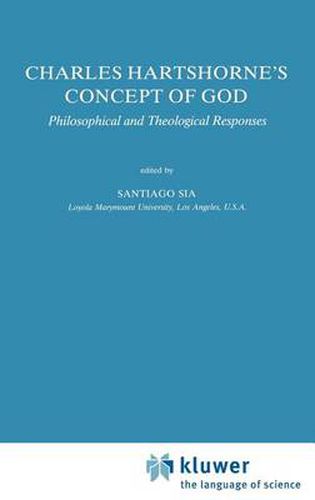Readings Newsletter
Become a Readings Member to make your shopping experience even easier.
Sign in or sign up for free!
You’re not far away from qualifying for FREE standard shipping within Australia
You’ve qualified for FREE standard shipping within Australia
The cart is loading…






This title is printed to order. This book may have been self-published. If so, we cannot guarantee the quality of the content. In the main most books will have gone through the editing process however some may not. We therefore suggest that you be aware of this before ordering this book. If in doubt check either the author or publisher’s details as we are unable to accept any returns unless they are faulty. Please contact us if you have any questions.
Charles Hartshorne’s considerable writings have been influential in contem 1 porary religious and philosophical thought. Not only is he regarded as the leading living representative of process thought as well as a much respected interpreter of Whitehead, but he has also established himself as an original 2 and creative thinker in his own right. The literature on his philosophy has been rapidly increasing. His thought and influence have also been the subject 3 of a number of conferences and gatherings of scholars. One of Hartshorne’s most notable contributions to contemporary philoso 4 phy and theology is his concept of God. In his writings he has set out to formulate the idea of deity so as to preserve, perhaps increase, its religious value, while yet avoiding the contradictions which seem inseparable from the 5 idea as customarily defined. The result of his efforts has been the develop ment of the concept of a dipolar God (insofar as contrasting metaphysical predicates, e.g. relative/absolute, contingent/necessary, finite/infinite and so on, are affirmed as applicable to God although always in an eminent way). Inasmuch as he has elaborated this concept in close dialogue with classical theism, he also refers to it as neo-classical . Because of the emphasis he places on the reality of change and becoming in his metaphysics (which regards God as the chief exemplification of metaphysical principles), the term 6 process has likewise been used to describe his notion of God.
$9.00 standard shipping within Australia
FREE standard shipping within Australia for orders over $100.00
Express & International shipping calculated at checkout
This title is printed to order. This book may have been self-published. If so, we cannot guarantee the quality of the content. In the main most books will have gone through the editing process however some may not. We therefore suggest that you be aware of this before ordering this book. If in doubt check either the author or publisher’s details as we are unable to accept any returns unless they are faulty. Please contact us if you have any questions.
Charles Hartshorne’s considerable writings have been influential in contem 1 porary religious and philosophical thought. Not only is he regarded as the leading living representative of process thought as well as a much respected interpreter of Whitehead, but he has also established himself as an original 2 and creative thinker in his own right. The literature on his philosophy has been rapidly increasing. His thought and influence have also been the subject 3 of a number of conferences and gatherings of scholars. One of Hartshorne’s most notable contributions to contemporary philoso 4 phy and theology is his concept of God. In his writings he has set out to formulate the idea of deity so as to preserve, perhaps increase, its religious value, while yet avoiding the contradictions which seem inseparable from the 5 idea as customarily defined. The result of his efforts has been the develop ment of the concept of a dipolar God (insofar as contrasting metaphysical predicates, e.g. relative/absolute, contingent/necessary, finite/infinite and so on, are affirmed as applicable to God although always in an eminent way). Inasmuch as he has elaborated this concept in close dialogue with classical theism, he also refers to it as neo-classical . Because of the emphasis he places on the reality of change and becoming in his metaphysics (which regards God as the chief exemplification of metaphysical principles), the term 6 process has likewise been used to describe his notion of God.